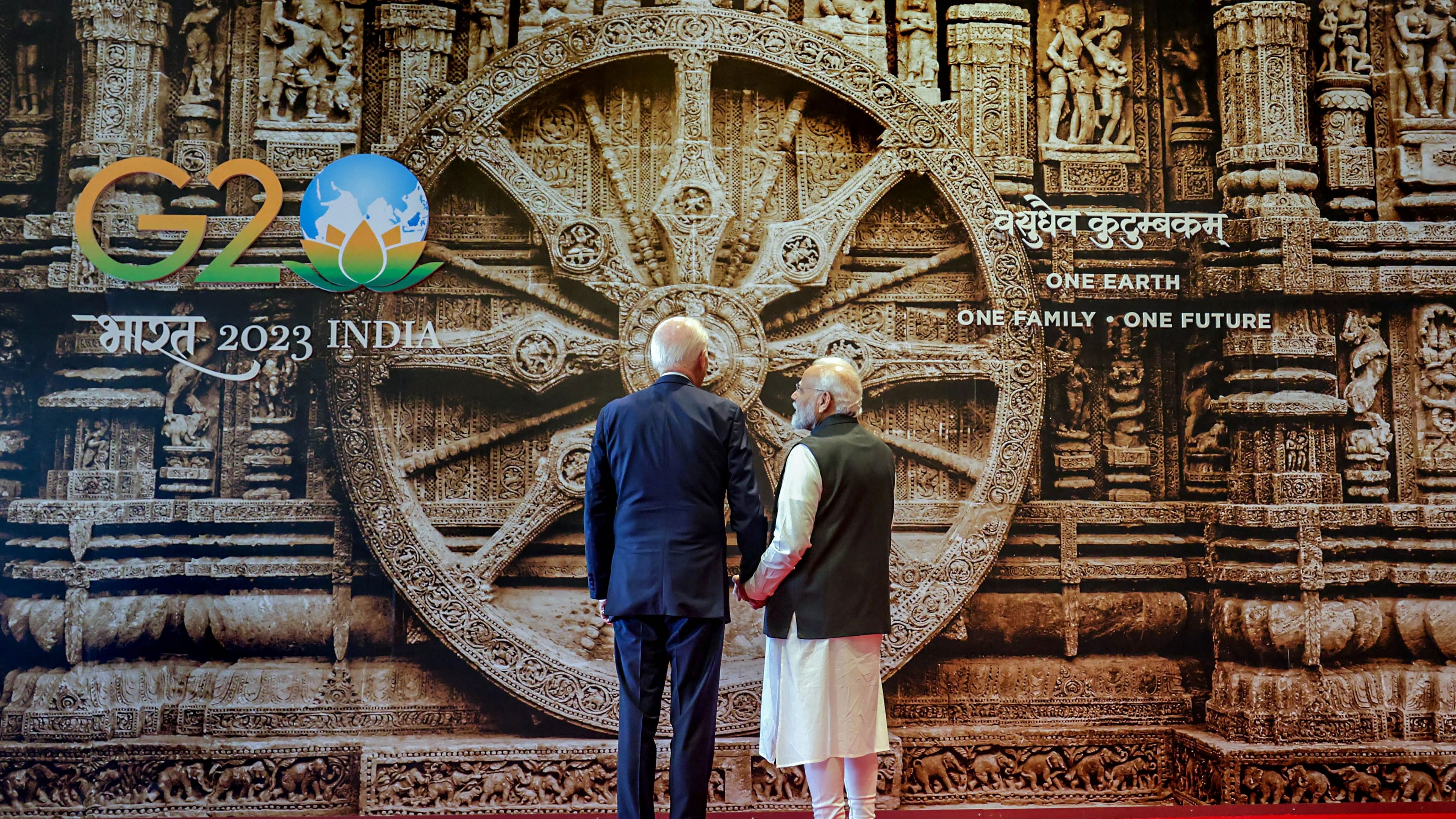
Prime Minister Narendra Modi explains the history of the Konark Wheel, a replica of which is serving as the backdrop, to US President Joe Biden upon his arrival for the G20 Summit at the Bharat Mandapam, in New Delhi.
Credit: PTI
From the 13th century Konark temple of Odisha to the ancient Nalanda University in Bihar, the G20 Summit venue here has put a spotlight on the rich architectural heritage of India.
As President Droupadi Murmu and Prime Minister Narendra Modi welcomed the guests at a ceremonial dinner for various heads of state and other world leaders and their spouses at the Bharat Mandapam venue on Saturday night, a replica of the ancient Nalanda University - a UNESCO World Heritage Site - in Bihar formed the backdrop.
Nalanda University is one of the oldest universities of the world.
While greeting guests, the prime minister was also seen explaining to some of the G20 leaders, including UK Prime Minister Rishi Sunak, about the importance of the university.
Officials noted that the Nalanda University represents an embrace of diversity, meritocracy, freedom of thought, collective governance, autonomy, and knowledge sharing - all aligning with the core principles of democracy.
Nalanda is a living testament to the enduring spirit of India's advanced educational pursuit and its commitment to building a harmonious world community, aligning with India's G20 Presidency theme, Vasudhaiva Kutumbakam, they said.
And, if Nalanda was the backdrop at the evening reception, India's Konark wheel came in sharp focus in the morning as a a beautiful image of the Sun Temple at Konark in Odisha formed the backdrop when the prime minister greeted G20 leaders before the start of the Summit at the Bharat Mandapam.
Built in the 13th century, the Sun Temple at Konark is a UNESCO World Heritage Site.
It was constructed in the reign of King Narasimhadeva I.The Konark wheel with 24 spokes is also adapted into India's national flag, and it embodies India's ancient wisdom, advanced civilisation, and architectural excellence.
On the shores of the Bay of Bengal, bathed in the rays of the rising sun, the temple at Konark is a monumental representation of the sun god Surya's chariot; its 24 wheels are decorated with symbolic designs and it is led by a team of six horses, according to the website of UNESCO.
The rotating motion of the Konark Wheel, symbolizes time, 'Kalachakra' as well as progress and continuous change. It serves as a powerful symbol of the wheel of democracy that reflects the resilience of democratic ideals, and commitment to progress in society, officials said.
MyGovIndia on Saturday posted on 'X' a video of the welcome greetings offered by Prime Minister Modi to world leaders with a caption 'G20's Iconic Greeting - Konark's Kaalchakra Takes Centre Stage'.
Bharat Mandapam itself bears artworks in its hallway, including a sculptural installation titled 'Surya Dwar' which also depicts mythical horses of the Sun God.
The Ministry of Culture has celebrated India's cultural heritage as well as those of other G20 member nations and invited countries through a 'Culture Corridor' set up in the hallway skirting the Summit room.
Iconic art objects in physical and digital forms have been displayed in this curated temporary 'art corridor' made especially for the big occasion.
Panini's grammar treatise 'Ashtadhyayi', Rig Veda inscription and digital images of Bhimbhetka cave paintings in Madhya Pradesh, dating back to approximately 30,000 years, have also been displayed as part of this project.
"As India prepares to welcome world leaders for the historic G20Summit, the cultural corridor at #BharatMandapam stands as a testament to global heritage and a celebration of the belief in #VasudhaivaKutumbakam Witness this remarkable display #CultureUnitesAll #G20Summit2023," the Ministry of Culture posted on 'X' along with a video on Saturday.
In another post in Hindi, the ministry shared various art elements of the complex, including a 27-foot high statue of Nataraja and said, 'This Mahamandapam reflects our great cultural and historical legacies'.
The iconic statue was made using the ancient lost-wax technique of metal casting that was used for making the famed Chola bronzes.
According to a plaque installed next to the statue, the sculptural art is titled 'Embracing Eternity', Siva Nataraja's Dance of Cosmic Creation.
The G20 Summit began at the Bharat Mandapam on Saturday and will conclude on Sunday.
Top world leaders, including US President Joe Biden, UK Prime Minister Sunak, Brazil President Luiz Inácio Lula da Silva, Japan Prime Minister Fumio Kishida, Italy Prime Minister Giorgia Meloni and several others have gathered here for the G20 Summit.